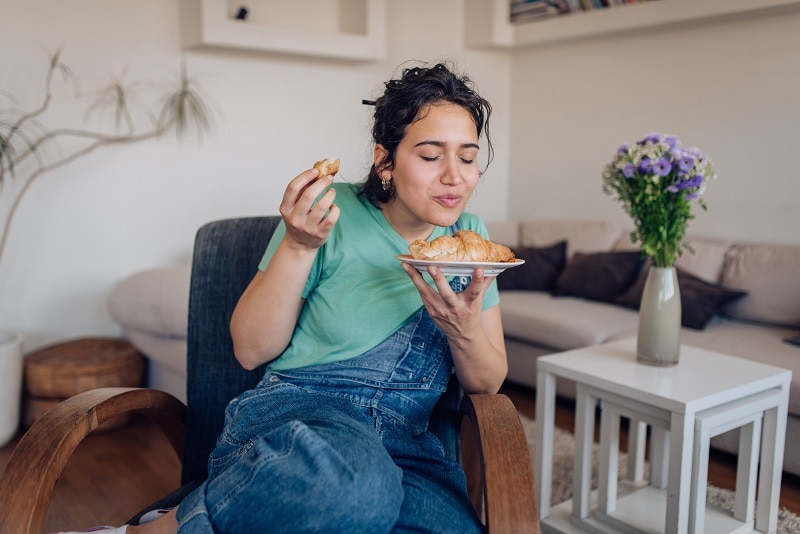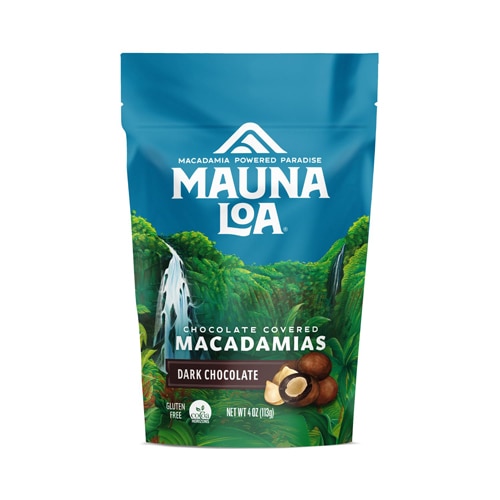[vc_row][vc_column][vc_column_text]When you hear the word “anti-diet”, what comes to mind? Is it
binging on all the foods you wouldn’t ever allow yourself to eat while on a diet? Is it eating a diet full of so-called junk food and avoiding anything that has even remote nutritional benefits?
Or perhaps you think of an eating-style somewhat in the middle – one that rejects the diet mentality and gives yourself permission to eat all foods – without assigning moral value to any of them.
If that third thought belongs to you, you’re on the right track. I’m Joanna Foley, a dietitian of over 10 years, a recovered eating disorder sufferer, and a lover of food: both salad and ice cream alike. I’m here to share about what my journey towards
food freedom as an anti-diet RD looks like, and tell you how and why you can experience it too.

Anti-Diet Movement: Why Embrace the Lifestyle?
If you’ve read my other article about the
anti-diet movement, you may already know a little about what the “anti-diet” movement is and why it may be the missing ingredient to helping you heal your relationship with food. But if you haven’t, let me summarize it here:
adopting an anti-diet mindset surrounding food can change everything. From the decisions you make about what to buy in the grocery store to what to eat for breakfast to whether or not to have a post-dinner snack, even if you aren’t actually hungry.
It changes how you feel about yourself after eating dessert, your thoughts on whether or not other people are judging your portion sizes, and really helps you break free from the fear of food judgment all together.
In other words, to take part in the anti-diet movement means to:
- View your daily habits and relationship with food as a much more important marker of health than the number on the scale
- Release shame and self-judgment regarding your body size or eating habits
- Honor your body by eating a wide variety of foods, including many that nourish you, and some just for fun
- Rejecting the belief that there is “one perfect way to eat”.
- And so much more…
Ultimately, adopting an anti-diet lifestyle means to have
freedom with food. And who doesn’t want that?
How do I live out an anti-diet lifestyle?
Even if hearing these things about an anti-diet resonates with you, you may struggle to understand what it actually looks like in daily life. So, to offer some help here are 4 practical ways of how I live out an anti-diet lifestyle on a daily basis:
1. I get rid of guilt.
I recently saw an advertisement that said “imagine guilt-free bread”. My first thought was “why should bread make me feel guilty in the first place?”. Yet this is a perfect example of the way
diet culture tries to sneak into your life. By making you believe that you DO, in fact, need to feel guilty for eating certain foods.
Throughout the healing process of my
eating disorder many years ago, I have learned that guilt has no place in my thoughts or beliefs about food. As long as I enjoy the food and it doesn’t make me sick, I give myself permission to eat it. It doesn’t matter what everyone else is doing. It doesn’t matter if you read that eating bread will cause XYZ (fill in the blank with whatever headline you’ve seen). There is no valid reason for guilt. Period.
2. I don’t skip meals.
When I was an adolescent, I used to skip
breakfast all the time. It wasn’t always out of a restriction mindset, but either way it wasn’t a healthy choice for my mind or my body. While skipping meals is often promoted in the health world (think
intermittent fasting), the truth is that
ignoring your hunger half of the day isn’t something to celebrate. There are so many negative nutritional and metabolic implications of this practice that I won’t go into here, but skipping meals also takes a toll on your mindset with food.
When you skip a meal, you are likely to believe that you now have permission to eat “more” – or perhaps just different types of foods – at your next meal. Or maybe you believe that you were “good” because you skipped a meal. These beliefs may be conscious or subconscious, but either way it sets you up to have erratic eating habits that don’t honor your body nor your relationship with food. So eat the meal, whatever it may look like. Even on your busiest of days. Each time you do, you build trust in your body that you will nourish it regularly.
3. I eat to fullness.
It’s undeniable that there is a silent expectation (both from yourself and often from others) regarding how much you will eat at a given meal/snack/dessert/whatever. Afterall, you don’t want to come across as eating “too much” (goodness forbid), nor do you want people to think you eat too little. Either way, you feel judged. This preoccupation and obsession with how much to eat strays so far from what an anti-diet lifestyle looks like, so it’s got to go.
Sadly, what I just described used to be me. Yet now, I don’t worry about what other people will think of my eating habits, and I certainly don’t set rules for how much I am “allowed” to eat. Some days or meals I eat less, and some days or meals I eat more. It all balances out, and I don’t need to justify it to anyone. I will eat as much as I want to eat in order to get full, and sometimes I may graze a little more simply because I like the food. It’s all okay, and I don’t worry for one minute about any sort of “diet”.
4. I focus on the big picture when it comes to nutrition.
Now, I AM a dietitian, so naturally I am passionate about good health. But when I talk about adopting an anti-diet lifestyle, people often assume I am referring to ignoring the nutritional value of foods and just eating whatever I want. Yet rejecting diet culture doesn’t mean forgetting about health or nutrition.
The truth is that
you can absolutely choose to follow a healthy diet and lifestyle while also rejecting diet culture. The key is just to not allow that healthy diet become an obsession. The moment you become overly obsessed about eating too much of a certain food group or fearing another food or ingredient, you have begun to fall into the diet culture trap.
‘For me, this looks like not getting too caught up in the nutritional value of what I eat. Yes, I do eat many nutritious foods on a daily basis (because I want to, not because I feel forced to). But I also love dessert, and some days I eat more processed food than others. Yet if I zoom out and look at the big picture, I can see that my diet is pretty balanced, and one that I am very comfortable with.
How do you begin to adopt an anti-diet lifestyle?
Adopting an anti-diet mindset surrounding food takes time. Potentially a lot of time. If you are someone who lives by a set of strict food rules (which to be honest, includes most of us), it is simply unrealistic to expect yourself to be able to break free from them all at once. Yet even though it can be a long process, every step forward counts.
The first place to start is to simply become more aware of your thoughts surrounding food. How often do you find yourself judging food or your body? How often are you restricting? Take time to acknowledge where you’re at with your relationship with food, so that you can know what perhaps needs to be worked on.
Then, I strongly recommend becoming familiar with the concept of
intuitive eating. This approach to eating lays out a set of 10 principles to meditate on and aim to apply as able. Among these principles include things like learning how to truly become in tune with and honor your hunger and fullness levels, and challenging your internal food police.
Finally, try to pick one area at a time where you may be able to make some positive changes to support your relationship with food. Maybe it’s being more diligent to eat actual meals. Maybe it’s giving yourself permission to eat what you actually want, and not just what you think you “should”. Or maybe it's making a conscious decision to let go of guilt or shame about what or how much you eat. Pick one thing at a time, and go from there.
In summary
I hope after reading these words you feel encouraged and empowered to take a good look at your own thoughts and beliefs about food, and to perhaps make changes where necessary. Even as an RD who is passionate about good health, I’ve come to realize that your relationship with food matters perhaps just as much as its nutritional value. And that’s HUGE.
Our culture has made the topic of eating so complicated, but it really doesn’t have to be. Listen to your body, and remember that perfection should never be the goal. Since this isn’t a “diet”, there’s really no way to fail at it in the first place.[/vc_column_text][/vc_column][/vc_row][vc_row][vc_column][vc_text_separator title="Featured Products" border_width="2"][vc_row_inner equal_height="yes" content_placement="middle" gap="35"][vc_column_inner width="1/3"][vc_single_image image="177393" img_size="full" alignment="center" onclick="custom_link" img_link_target="_blank" css=".vc_custom_1724277511712{padding-right: 7% !important;padding-left: 7% !important;}" link="https://www.vitacost.com/seven-sundays-muesli-cereal-rise-shine-mix-strawberry-banana-nut"][/vc_column_inner][vc_column_inner width="1/3"][vc_single_image image="177392" img_size="full" alignment="center" onclick="custom_link" img_link_target="_blank" css=".vc_custom_1724277550820{padding-right: 7% !important;padding-left: 7% !important;}" link="https://www.vitacost.com/fit-butters-cashew-butter-cocoa-pebbles"][/vc_column_inner][vc_column_inner width="1/3"][vc_single_image image="177391" img_size="full" alignment="center" onclick="custom_link" img_link_target="_blank" css=".vc_custom_1724277568364{padding-right: 7% !important;padding-left: 7% !important;}" link="https://www.vitacost.com/endangered-species-mini-truffle-bars-sea-salt-dipped-in-55-cocoa"][/vc_column_inner][/vc_row_inner][/vc_column][/vc_row]




